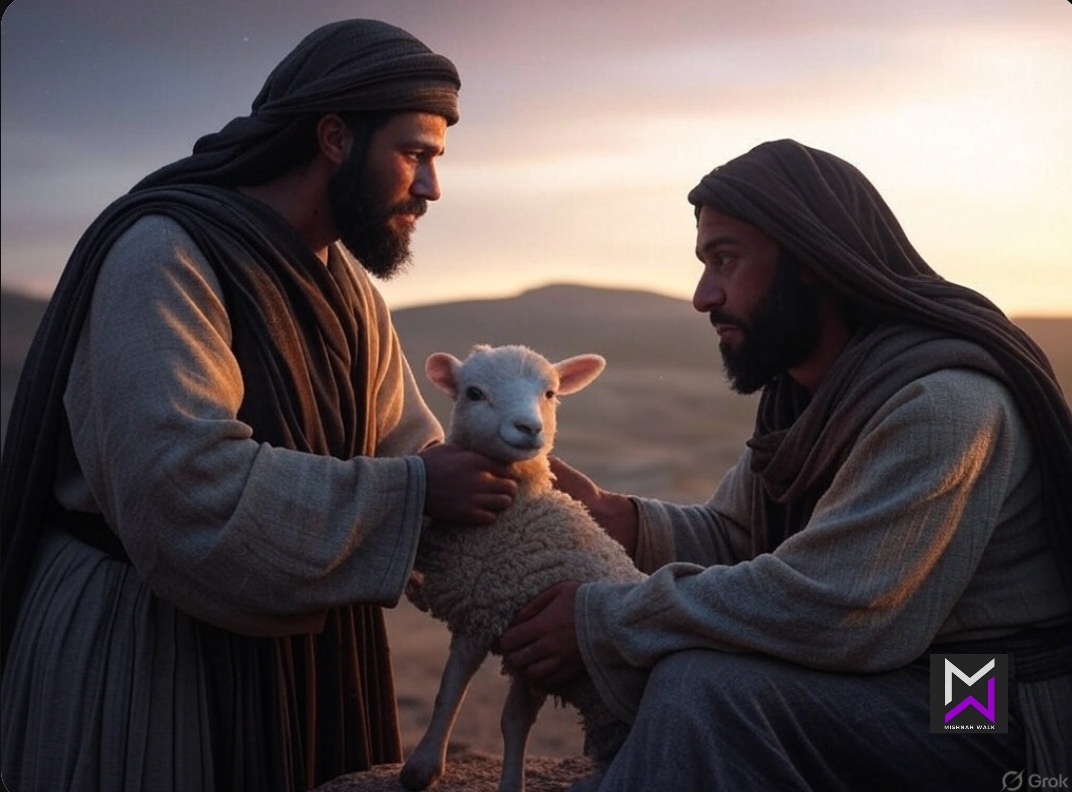The Golan hills stretched endlessly before Yosef ben Ezra’s farm, their rugged slopes dotted with wildflowers and grazing sheep. The late afternoon sun cast a warm, golden light over the land, painting the barley fields in hues of amber and green. Yosef stood at the edge of his flock, his weathered hands resting on a wooden staff, watching his 12-year-old son, Eli, chase a wayward lamb through the grass. Nearby, 10-year-old Miriam sat cross-legged on a flat stone, weaving a basket from dried reeds, her laughter echoing like a melody across the hills.
Yosef’s family had worked this land for generations, tending their sheep with care and honoring the Torah in all they did. “The Torah is our guide,” Yosef often told his children, his voice as steady as the ancient olive trees that lined their property. “It teaches us how to live, how to care for the land, and how to treat others.” But today, a shadow had fallen over their peaceful routine.
One of the hired hands, a young man from a neighboring village, had been tasked with slaughtering a lamb for the family’s evening meal. Yosef had been called away to mend a broken fence, trusting the worker to follow the precise method of slaughter required by the Torah. But when Yosef returned, he found the lamb lying lifeless on the ground, its throat cut improperly. The worker, unaware of the Torah’s strict guidelines, had not performed the shechita correctly. The lamb was now nevelah—restricted for the family to eat.
Eli, who had been helping with the flock, ran to his father’s side, his face flushed with concern. “Abba, what’s wrong?” he asked, his eyes fixed on the lamb. “Why can’t we eat it? Is the meat bad now?”
Yosef knelt beside the animal, running a hand over its thick wool. “No, Eli, the meat isn’t bad—it hasn’t spoiled,” he said gently. “But the Torah is clear in Deuteronomy 14:21: ‘You shall not eat anything that has died naturally or is improperly slaughtered.’ This lamb is nevelah because it wasn’t slaughtered according to God’s instructions. For us, as Israelites, it’s now restricted by our purity laws.” He paused, seeing the confusion in Eli’s eyes, and continued, “Think of it this way: the Torah tells us that pork is nevelah for us because pigs are unclean animals—we’re restricted from eating them. When this lamb was improperly slaughtered, it became like pork to us. We can’t eat it, but that doesn’t mean there’s anything wrong with the meat itself. For others, like a ger or a foreigner, the lamb is perfectly fine to eat.”
Eli nodded slowly, his brow still furrowed. “So, it’s not bad meat—it’s just that the Torah sets us apart?” he asked.
“Exactly,” Yosef said, a smile breaking across his face. “The Torah calls us to be holy, and part of that holiness is in what we eat. But God’s care extends to all people, even those who aren’t bound by the same laws.” He stood, brushing the dirt from his hands, and looked toward the horizon. The market in a nearby town was a day’s journey away, and foreigners often passed through, trading goods from distant lands. “The Torah says we may give nevelah to a ger—a sojourner living among us—or sell it to a foreigner. Perhaps I should take the lamb to the market tomorrow,” he mused aloud. “A foreigner might buy it, and we could recover some of the loss. It’s a good lamb, after all—its wool alone is worth a few coins.”
Miriam set her basket down and tilted her head, her dark eyes thoughtful. “Abba,” she said softly, “what about the ger family who lives down the hill? The ones who came from the east last year, after their village was destroyed? I heard Ima say their crops failed this season, and they’ve been struggling to feed their children. Couldn’t we give the lamb to them instead of selling it?” She hesitated, then added, “The Torah says we should love the ger as ourselves, doesn’t it? I remember you teaching us that it’s written 36 times—more than almost any other command.”
Yosef turned to his daughter, struck by her words. He recalled the verse from Leviticus 19:34: “The stranger who sojourns with you shall be to you as the native among you, and you shall love him as yourself, for you were strangers in the land of Egypt.” The Torah’s command was clear, and Miriam’s suggestion stirred a question in his heart: What does it mean to truly love the ger as myself? Would I want someone to sell food I could use, or give it to me in a time of need?
Eli nodded eagerly, his earlier confusion replaced with excitement. “Yes, Abba! Let’s give it to them! They’ve always been kind to us—they even shared their olives with us last fall when our trees didn’t bear fruit.”
Yosef smiled at his children, his heart warmed by their eagerness. “Miriam, you’ve reminded me of what’s most important. Selling the lamb might bring a few coins, but giving it to the ger family will bring a greater blessing—to them and to us.”
The decision made, Yosef and his children prepared the lamb for the journey down the hill. Rachel, their mother, joined them, her face glowing with pride as she heard Miriam’s suggestion. “You’ve learned well, my daughter,” she said, tucking a strand of hair behind Miriam’s ear. “The Torah isn’t just about rules—it’s about loving others as God loves us.”
The ger family lived in a modest dwelling near a grove of olive trees, their home a simple structure of stone and wood. The father, a man named Tzuriel, was outside mending a fishing net when the ben Ezra family approached. His wife, Na’ama, stood at the doorway, her two small children—a boy and a girl, both around Eli and Miriam’s age—playing nearby with a small wooden toy. When Yosef approached, Tzuriel stood to greet him, his weathered face curious.
“Tzuriel, Na’ama,” Yosef began, his voice warm, “we’ve brought something for your family. This lamb was improperly slaughtered, and because of our purity laws, we’re restricted from eating it. But there’s nothing wrong with the meat—it’s perfectly fine for you to eat. The Torah allows us to give it to a ger like you, and we’d like you to have it.”
Tzuriel’s eyes widened with gratitude, and Na’ama stepped forward, her hands clasped together. “You would give this to us?” Tzuriel asked, his voice thick with emotion. “We’ve had so little meat this season, and the children have been hungry. This is a great kindness.” Na’ama nodded, her eyes shining. “Thank you,” she said, her voice trembling. “We’ve felt so alone since we came here, but you’ve made us feel like family.”
The ger children, noticing the visitors, ran over to Eli and Miriam, their faces bright with excitement. “Do you want to play?” the boy asked, holding up the wooden toy—a small carved boat. Eli grinned and nodded, and soon the four children were running through the olive grove, laughing as they took turns pushing the toy boat along the ground and pretending to sail on the Sea of Galilee. Miriam showed the ger girl how to weave a simple bracelet from grass, their chatter filling the air with joy.
Yosef watched the children play, his heart full. The Torah calls us to love the ger, and look how that love brings our children together as friends. How does this kind of kindness reflect God’s desire for His people to be a blessing to all nations?
As the ben Ezra family walked back to their farm, the stars began to twinkle in the evening sky. Yosef felt a deep peace in his heart, knowing they had honored the Torah’s command. A few days later, he took Eli and Miriam to the Sea of Galilee to check on their fishing nets. The morning air was crisp, the water shimmering like a sheet of glass under the rising sun. As they worked, a small group of sheep from a nearby flock began to leap and play along the shore, their jumps high and carefree, as if dancing with the waves.
Eli watched them, his laughter ringing out like a song. “Look, Abba! They’re so happy!” he shouted, pointing at the sheep. Miriam joined in, her giggles blending with her brother’s. Yosef smiled, his heart full. Even in the midst of challenges, like the loss of a lamb, God’s creation brings us joy. How does this joy reflect the heart of the Torah, which calls us to live with gratitude and generosity?
Back at home that evening, as the family gathered around their table, Rachel lit the oil lamps, their soft glow filling the room. Yosef looked at his children and asked, “What did we learn from the lamb that became a blessing?” Eli thought for a moment, then said, “That the Torah isn’t just about what we can’t do—it’s about how we can bless others and in obedience reveal the love of God to all men.” Miriam nodded. “And that loving the ger means treating them like family, even when it costs us something.”
Yosef nodded, his eyes warm with pride. “Yes, my children. The Torah teaches us to be holy, but it also teaches us to be a light to others. How can we continue to show this kind of love in our daily lives—not just to the ger, but to all who cross our path?” The question lingered in the air as the family bowed their heads, giving thanks for the lessons of the day and the Torah that guided their every step.


Leave a Reply